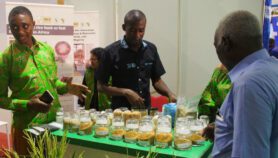By: Mićo Tatalović
Send to a friend
The details you provide on this page will not be used to send unsolicited email, and will not be sold to a 3rd party. See privacy policy.
[LONDON] Indian children have been given measles vaccines by inhalation through a mask, in a trial of a technique that could transform vaccine delivery in remote areas.
Researchers at the WHO Measles Aerosol Project are analysing data from the final phase III trial. If the efficiency is as high as in previous trials, which matched needle vaccination, the aerosol method could soon be rolled out.
"We have finished a clinical trial with more than 2,000 children in India," said Marie-Paule Kieny, the WHO’s assistant director-general for innovation, information, evidence and research. "This is a pivotal trial for licensure."
Speaking at a seminar at the UK’s London School of Hygiene and Tropical Medicine this week (18 July), she said: "Measles is still a big problem in terms of children’s deaths … especially in developing countries. Having availability of a vaccine that could be given by respiratory means instead of being injected would certainly be a plus in some countries, like India."
Unlike injections, aerosols can be delivered by untrained health workers. Although they still need cold storage, which is a big challenge in developing countries, Kieny said that measles vaccines are "quite heat stable" before reconstitution.
There are already needle-free vaccines for other diseases, such as oral polio or cholera vaccines and a nasal spray for influenza. Millions of Mexican children received a measles aerosol vaccine a few years ago, but the delivery device was not suitable for field use, Kieny said.
The new device comprises a disposable mask connected to a nebuliser that turns vaccine into the aerosol. A rechargeable battery can provide electricity for the nebuliser. A health worker puts the mask on a child and activates the nebuliser, and the vaccination takes 30 seconds.
"This is not very much longer than it takes to change the syringe and needle for each child. The device functions with multi-dose vials, and only the disposable mask has to be changed," Kieny said.
Daniel Berman, deputy director of the Campaign for Access to Essential Medicines at Médecins Sans Frontières, welcomed research on alternative vaccine delivery mechanisms as a means of increasing coverage.
"We tend to vaccinate the same kids over and over, and we tend to miss the same kids — and that’s a function of their access to health structures," he said. "It’s incredibly important to simplify and adapt products."
Naveen Thacker, a paediatrician at Deep Children Hospital, in Gujarat, India, and former president of the Indian Academy of Paediatrics said: "It’s a great project that will definitely be useful in India and other countries for mass campaigns. Measles are the next on target after polio in India."
This device will also be more acceptable to the parents, as pricks are often associated with side effects and fear, he said.
The project is a collaboration between the WHO, the American Red Cross, the US Centers for Disease Prevention and Control, and the private companies Serum Institute of India and Ireland’s Aerogen, with funding from the Bill and Melinda Gates Foundation.













